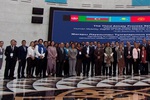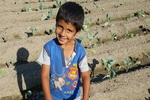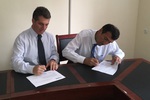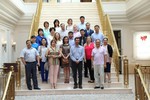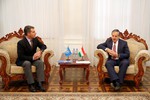Water for Peace in Osh ProvinceAccess to water determines stability in Fergana valley. Starting from spring to early autumn the shortage of irrigation water becomes a subject of disputes and conflicts between communities as the access to sufficient amounts of irrigation water is crucial for most farmers in southern Kyrgyzstan. The two communities of “Zulpuev” and “Mirmahmudov” have been engaged in constant disputes and conflicts over irrigation water. The issue becomes even more critical during the periods of drought since more water is demanded for irrigation needs. Worse, latent conflicts turn into open violence with the involvement of youths.
With the collapse of the Soviet Union, almost all the irrigation systems collapsed. The condition of an irrigation channel and networks providing water to two communities deteriorated rapidly, decreasing the volume of water for households. Since the problem has a large scale scope, the Government of the Kyrgyz Republic conducted a reform decentralizing water management and transferring control of water to Water Users’ Associations (WUA). However, effectiveness of each WUA and Water Management District heavily depends on socio-economic and other factors.
For example, two communities of Zulpuev and Mirmahmudov individually tried to install a system of common water use. The success of these endeavors was limited, as the problem was not addressed jointly.
In 2015, UNHCR selected this case to decrease the conflict potential between two communities. Through UNHCR’s partner, Foundation for Tolerance International (FTI), a range of meetings with representatives of ayil okmotu, members of local councils, community leaders, and staff of WUA were held to analyze the situation and find a durable solution for both sides. In addition to the meetings, FTI organized a roundtable where all participants expressed their opinions and possible solutions to this situation.
During these meetings it became apparent that the residents of both communities are indeed prepared to negotiate and jointly work on restoration and management of the water channel.
"The resolution of water shortage depends on joint efforts. Every year we raised the problem with the local authorities but effective measures have not been taken because of lack of funds. If we fail to resolve the problem with irrigation water, the relations between communities will continue to deteriorate, especially during vegetation period,” said Dastanbek Ajibekov, member of the local council in Mirmahmudova ayil okmotu.
UNHCR and FTI focus on mobilization and consolidation of all stakeholders, including community activists, local authorities, water users association and others. UNHCR is ready to provide technical assistance to support the communities’ contributions in order to resolve the problem of irrigation water.
A representative of WUA Abibilla Kimsanov said: “The WUA takes responsibility to bring water to all households and their fields. We tried to solve the issue but failed. Lack of comprehensive work, technical support, raising awareness of population resulted in growing problems from year to year. Spring and summer seasons have become a pain for our staff because we play an intermediary role between two conflicting sides. It is evident that this unresolved issue undermines the reputation and trust towards local authorities.”
As a result of all efforts taken by UNHCR and FTI, two communities unanimously agreed to implement a technical project. Participants of the roundtable established a working group which will monitor the construction of the head water, installation of locks, cleaning the channel, and awareness raising events for population of two communities. As of today, the prepatory works have already started and the new, comprehensive water irrigation system for both Zulpuev and Mirmahmudov will be fully functioning before the beginning of the planting season.
06.04.2015
|

